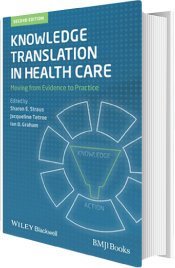K. Ann McKibbon and Cynthia Lokker
Department of Clinical Epidemiology and Biostatistics
McMaster University, Hamilton, ON, Canada
Download: Presentation (PDF, 180KB)
People involved in KT research and practice need to identify information from several categories:
- Evidence and evidence summaries (e.g., systematic reviews, clinical practice guidelines, health technology assessments [HTAs])
- Evidence to develop knowledge syntheses that form the basis of guidelines
- Successful KT interventions
- Information describing the theoretical bases (e.g., KT models or frameworks) important for designing and evaluating KT
Purpose
The purpose of this chapter is to provide:
- A description of where information can be found, and
- Vocabulary to use when searching for resources.
Getting started: how do we find knowledge syntheses?
Systematic reviews (including meta-analyses)
- Medline, CINAHL or smaller databases
- Health-evidence.ca site for reviews in public health
- Cochrane (health) and Campbell (social science) Collaborations
- Joanna Briggs Institute in Australia (nursing and other disciplines)
- UK Centre for Reviews and Dissemination at the University of York (includes reviews, economics studies and health technology assessments)
Clinical practice guidelines
- US Agency for Healthcare Research and Quality
- Canadian Medical Association
- NICE (UK National Institute for Health and Clinical Evidence)
- Guidelines International Network (GIN)
What should we do next: how do we search large databases?
- Examples are Medline (for medicine) or CINAHL (for nursing and allied health professionals)
- Additional sources described in Bzdel Resource Guide*
- Librarians can help with searching or search training
- Online tutorials (e.g., PubMed)
- Searching for KT interventions, theories or frameworks is difficult
- Filters such as PubMed Clinical Queries (RCTs or qualitative studies and health services research)
- KT Clearinghouse web site for other filters
* Bzdel, Winther and Graham (2004)
Should we search the Internet?
- For technical reports and other non-journal material
- Google or Google Scholar or other search engines
- TRIP – Turning Research into Practice Web site allows searching in multiple databases and resource collections from one search window
What are some existing collections of KT material?
- Atlantic Health Promotion Research Centre KT Library, Dalhousie University
- Canadian Health Services Research Foundation
- Centre for Health & Environment Research KT Database, University of British Columbia
- Cochrane Effective Practice and Organisation of Care Group, University of Ottawa
- Institute of Knowledge Transfer, UK
- KT+, McMaster University
- KU-UC, Laval University
- US National Center for the Dissemination of Disability Research library
- Research Transfer Network of Alberta (RTNA) Alberta Heritage Foundation for Medical Research
- Research Utilization Support and Help (RUSH) Southeastern Educational Development Laboratory, Austin TX
- CIHR KT Clearinghouse, University of Toronto
- National Coordinating Centre for Methods and Tools. Public Health Agency of Canada
- Keenan Research Centre – Research Programs Joint Program in Knowledge Translation – Literature
- Program in Policy Decision-Making at McMaster University, Canada
How do we search the grey literature?
- Information not under the jurisdiction of commercial publishers
- Often published by governments, academic centres and businesses (electronic or paper)
- Difficult to identify and obtain.
- University of British Columbia (how to search for unpublished literature)
- New York Academy of Medicine
- SIGLE (System for Information in Grey Literature in Europe)
- HTAi Vortal for HTAs and economic studies
How can we search for literature about KT?
- Difficult as KT is a new field that interrelates with several existing disciplines
- Evolving and varied vocabulary with multiple terms for the same concept
- Researchers: knowledge translation (CA), research utilization, implementation or diffusion (US, UK)
- Business uses terms related to marketing, advertising and change management
- Engineers talk about technology transfer
- Clinicians deal with adoption of new techniques and evidence-based practice
- Policy makers speak of evidence-informed decisions
Future Research
- Research is required for producing search filters for Medline and CINAHL
- Need more data on proven retrieval methods for Internet-based resources
- Need consensus on definitions and mapping of terms across disciplines
- Develop search engines that can search effectively across many KT resources and sites
Summary
- Searching for existing knowledge is a major foundation of KT
- Producing and summarizing existing evidence from multiple sources to address knowledge or action gaps is an important first step
-
KT researchers then need to learn about:
- methods and tools used in previous KT projects
- how best to build new programs
- theoretical constructs of KT
- Searching for evidence is difficult because of vocabulary and its multidisciplinary nature
- Contact librarians and others with experience in searching to help

